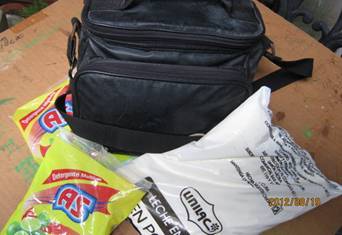 A few days agoI was chatting with a group of friends, all of whom were concerned about the shortages in the state-run hard currency stores and the growth of thebolsa negra*—“the black bag,” also known as the “black market” or “underground market.” This exchange of opinions proved interesting.
A few days agoI was chatting with a group of friends, all of whom were concerned about the shortages in the state-run hard currency stores and the growth of thebolsa negra*—“the black bag,” also known as the “black market” or “underground market.” This exchange of opinions proved interesting.
First of all, the shortage is a result of the lack of financial resources to acquire goods and products on the international market, and a weak domestic production capacity, incapable of supplying the market, or making up for the lack of imports. Both phenomena are related, and result in shelves that are either bare, or filled with mostly unwanted products in an effort to give our retail stores an illusion of abundance.
Thebolsa negraarises and develops in response to a shortage of goods or products necessary for daily life, especially those sold in state stores at prices set high to maximize profits on a small inventory. Thebolsa negragrows or shrinks depending on how many or how few goods are for sale, and also in relationship to their prices.
The formula is simple. If supplies of a product are abundant, but the price is a bit high, it can be obtained through thebolsa negrafor much less. If the product is in short supply, and cannot be found in stores, its price in thebolsa negrawill be much greater, sometimes more than double, depending on the number of middlemen there are between buyer and seller.
In the first instance the state, which has a commercial monopoly, suffers while the consumer benefits. In the second the consumer suffers since there is no option but to pay the price or do without the necessary item.
Up till now thebolsa negrahas been dealt with principally through repressive measures. These have amounted to spectacular raids, involving state inspectors and agents of public order, of places where the activity is known to be concentrated. Beyond the hub-bub and the shouting, however, the impact has been quite limited. After a few days it all reappears as usual, only with more gusto.
As has been demonstrated historically, it seems the only way to reduce it (eliminating it is practically impossible) is with stable supplies which satisfy the year-round needs of the population without any gaps. Until that is achieved, we will continue wasting time and resources to train state inspectors (whose numbers must be in the thousands), paying them high salaries so that they do not become corrupt or subject to bribes. Everything will continue as is, or perhaps even get worse.
Thebolsa negrais just one of many negative developments to come out of the national crisis. As long as it is not dealt with seriously—something beyond agreements, resolutions and multiple guidelines of dubious effectiveness and without real results—the bolsa negra will continue to grow and grow. Although that is not desired by anyone who thinks responsibly, at the moment it serves as an escape hatch, both for those who operate it and for its customers, even though it is illegal, suppressed and subject to prosecution.
As a neighbor of mine says, “From the time we get up in the morning, we commit crimes. Isn’t a good quality cup of coffee (not the adulterated kind from the store)illegal? And also the glass of milk (the kind you have not had legal access to for more than seven years) that we drink every morning?”
Perhaps one day in the not too distant future we can go back to living legally, even with abolsa negra. In the meantime, as the saying goes, “Every man for himself!”
*Translator’s note: In Spanish the word bolsa means a bag of some sort, but can also mean a type of market, such as a stock market.
August 23 2012
